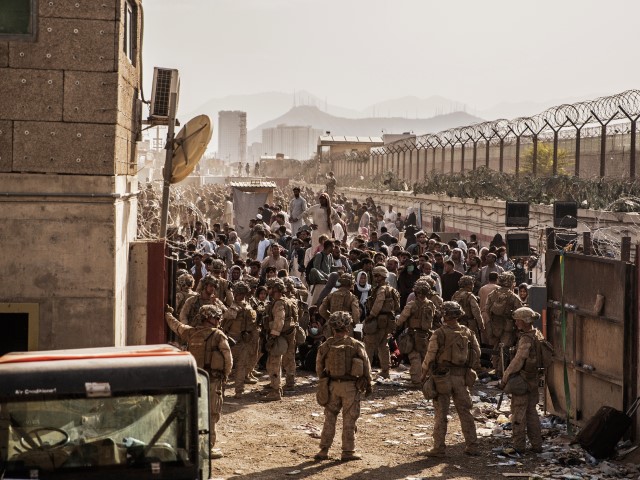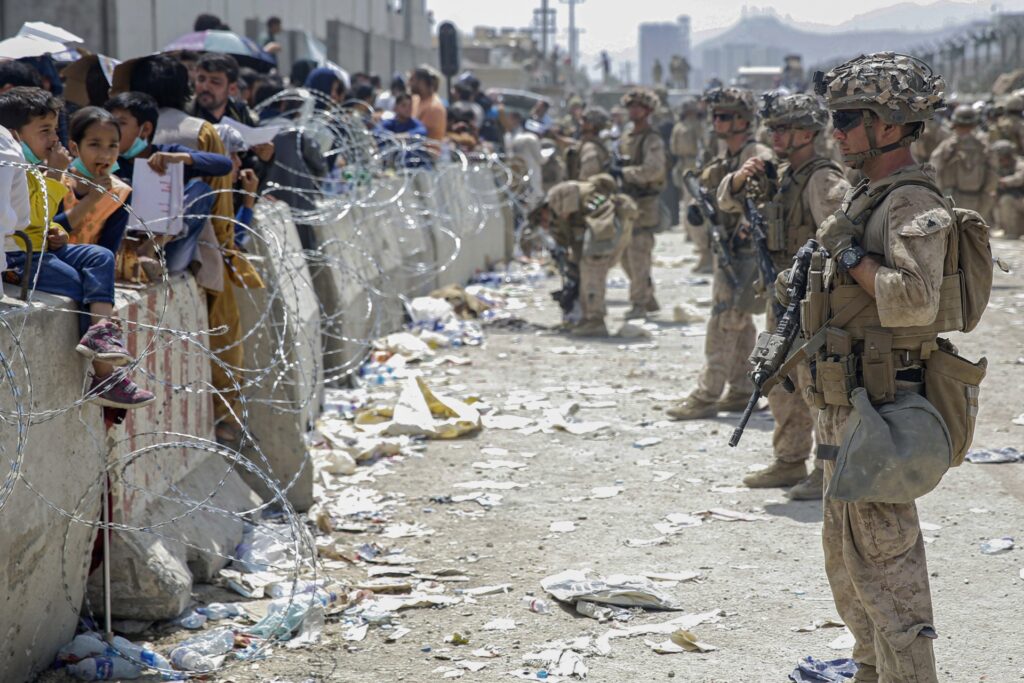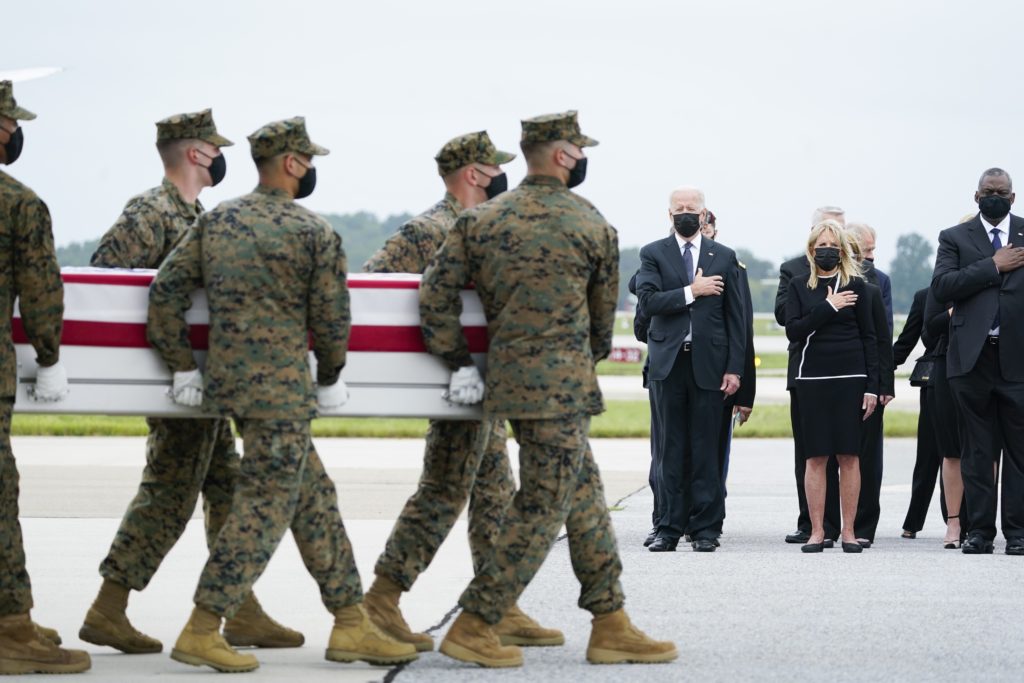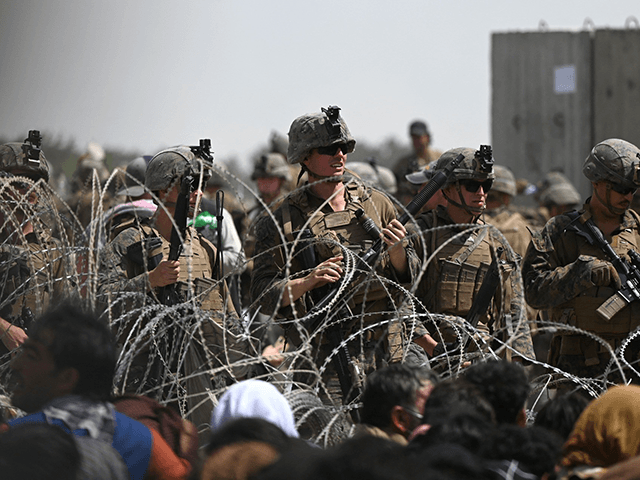United States Marine Sgt. Tyler Justin Vargas-Andrews broke down in tears during a House Foreign Affairs Committee hearing as he recalled the disastrous Afghanistan withdrawal and the Kabul airport bombing that left him grievously wounded and killed his mentor and friend.
It was the first hearing by House Republicans to examine the withdrawal that happened under the Biden administration’s watch and led to 13 service members killed — the highest casualty count for U.S. troops in Afghanistan in 10 years.
Vargas-Andrews said he and other Marines at the airport’s Abbey Gate actually spotted a man who fit the description of a possible suicide bomber before the bombing, and requested permission to kill him but were not given orders to shoot.
He said around 2 a.m. on August 26, intelligence personnel confirmed there was a suicide bomber nearing Abbey Gate, described as clean-shaven and wearing a brown dress, black vest, and traveling with a companion. He said he asked why the man had not been apprehended sooner if there was a full description but was told the intelligence asset could not be compromised.
He and other Marines disseminated the suicide bomber information to ground forces at Abbey Gate.

In this August 21, 2021, file photo, provided by the U.S. Marine Corps, U.S. Marines with Special Purpose Marine Air-Ground Task Force – Crisis Response – Central Command, provide assistance during an evacuation at Hamid Karzai International Airport, Kabul, Afghanistan. (Staff Sgt. Victor Mancilla/U.S. Marine Corps via AP)
Vargas-Andrews said he spotted the suspected suicide bomber between noon to 1 p.m., and two other Marines. The man fit the exact description, he said, and was “consistently and nervously looking up at our position through the crowd.”
He said they passed on the information of a potential threat and improvised explosive device attack imminent over the communication network.
“This was as serious as it can get. I requested engagement authority while my team leader was ready on the M110 Semi-Automatic Sniper System,” he said. He said the response was “leadership did not have the engagement authority for us. Do not engage.”

In this image provided by the U.S. Marines, U.S. Marines with Special Purpose Marine Air-Ground Task Force – Crisis Response – Central Command, provide assistance during an evacuation at Hamid Karzai International Airport in Kabul, Afghanistan, August 20, 2021. (Lance Cpl. Nicholas Guevara/U.S. Marine Corps via AP)
He said he requested for his battalion commander, Marine Lt. Col. Brad Whited, to come to the tower to see what they saw. Meanwhile, they checked with psychological operations personnel to confirm the suspect met the description.
Whited eventually arrived. They reassured him of the ease of fire on the target and asked again for engagement authority and permission. “We asked if we could shoot. Our battalion commander said, ‘I don’t know.'”
He said, “Myself and my team leader asked very harshly, ‘well, who does?’ Because this is your responsibility, Sir.’ He again replied, ‘he did not know but would find out.'”
“We received no update and never got our answer,” Vargas-Andrews said. Eventually, the man disappeared. To this day, we believe he was the suicide bomber.”

President Joe Biden, first lady Jill Biden and Secretary of Defense Lloyd Austin watch as a Marine Corps carry team moves a transfer case containing the remains of Marine Corps Lance Cpl. Dylan Merola, 20, of Rancho Cucamonga, California, Sunday, August 29, 2021, at Dover Air Force Base, Delaware. (AP Photo/Manuel Balce Ceneta)
“We made everyone on the ground aware. Operations had briefly halted but then started again. Plain and simple we were ignored. Our expertise was disregarded. No one was accountable for our safety,” he said.
Vargus-Andrews broke down as he began to talk about the bombing and the death of his friend and mentor, Marine Staff Sergeant Darrin Hoover.
Around 5:30 p.m. local time, Hoover asked him to help find an Afghan interpreter in the crowd in the canal, which was right outside Abbey Gate, he said. Although they found the interpreter and his brother, they said they had five family members still in the canal. They waited for the family members. Ten minutes later, he said he saw a flash and felt a massive wave of pressure.
“I’m thrown 12 feet on the ground, but instantly knew what had happened,” he said. He recalled:
I open my eyes to Marines dead or unconscious around me. A crowd of hundreds immediately vanished in front of me and my body was catastrophically wounded with 100-150 ball bearings now in it. Almost immediately we started taking fire from the neighborhood and I saw how injured I was with my right arm completely shredded and unusable. I saw my whole lower abdomen soaked in blood. I crawled backwards 7 feet because I thought I was still in harm’s way.
My body was overwhelmed from the trauma of the blast. My abdomen had been ripped open. Every inch of my exposed body except for my face took ball bearings and shrapnel. I tried to get up, but could not. Laying there for a few minutes, I started to lose consciousness when I heard Chas, my team leader, screaming my name as he ran to me. His voice, calling to me, kept me awake.
When he got to me, he dragged me to safety and immediately started triaging me. Tying tourniquets on my limbs, and doing anything he could to stop the bleeding and start plugging wounds with the help of other Marines.
I was awake through most of it. Screaming, moaning, and cursing.

U.S. soldiers stand guard behind barbed wire as Afghans sit on a roadside near the military part of the airport in Kabul on August 20, 2021, hoping to flee from the country after the Taliban’s military takeover of Afghanistan. (WAKIL KOHSAR/AFP via Getty Images)
Vargas-Andrews pleaded with lawmakers to ask him more about what he went through that day, claiming that no one wanted to interview him.
“Please ask me about getting shot at in the tower at Abbey Gate and how no one wanted my report post blast. Even NCIS and the FBI failed to interview me. Ask me to elaborate on my ordeal post blast. Ask me about this one little girl and her family I reunited,” he said. “Our military members and veterans deserve our best because that is what we give to America.”
“The withdrawal was a catastrophe in my opinion and there was an inexcusable lack of accountability and negligence. The eleven Marines, one Sailor, and one Soldier that were murdered that day have not been answered for. Thank you for giving me this opportunity to speak,” he said.
Breitbart News published a three-part series on the withdrawal. Read them here, here, and here.
Follow Breitbart News’s Kristina Wong on Twitter, Truth Social, or on Facebook.
COMMENTS
Please let us know if you're having issues with commenting.